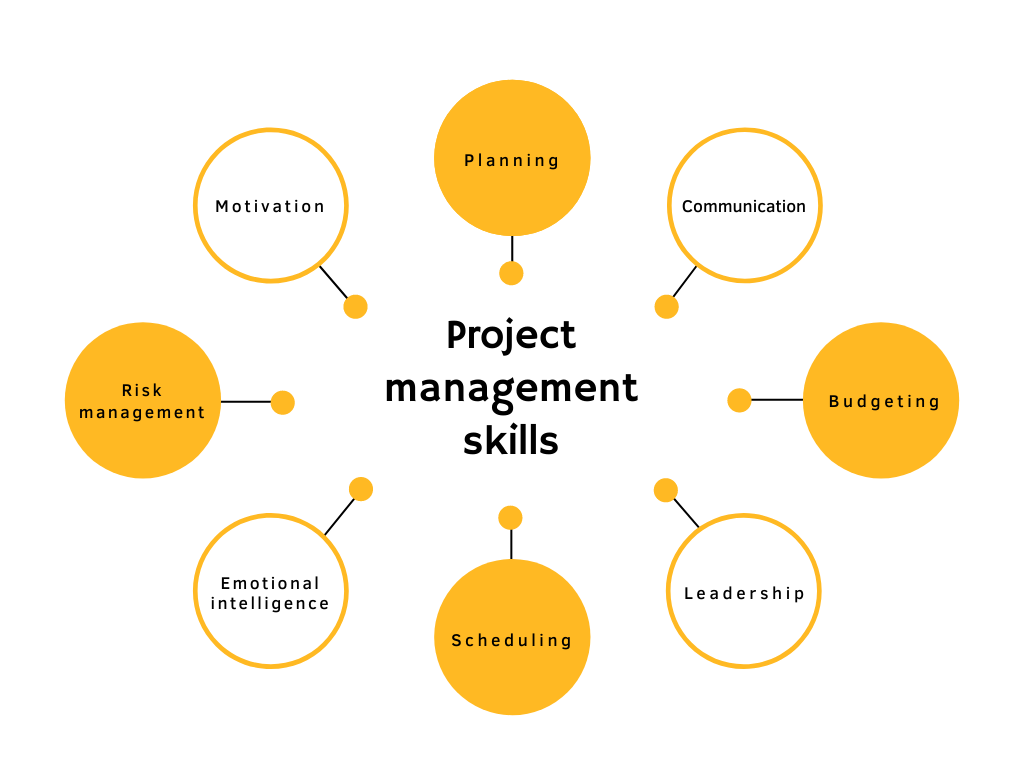To become a successful project manager, you must have both an educational background and experience in order to master the basics of project management. Beyond the formal training, you also need analytical skills, communication skills, leadership, and even guts, as this field is methodical and scrupulous. And, in order to prove you have what it takes to fulfill this position, you might even need certification in some cases.
Keep on reading to find out everything a project manager’s role acquires.
Project management Knowledge
Training
Online training might be the most obvious way to acquire project management knowledge. A structured or formal training, like a certification course, can be a huge asset along with affordable online courses that can be found on platforms such as Udemy, LinkedIn Learning, Coursera, Edx, etc.
Some organizations have internal programs that help you transition to project management, or they might equally provide coaching and mentoring opportunities. If your company offers project management training, you should take advantage of it.
Mentoring
You can always reach out to an experienced project manager for mentoring and guidance. For beginners, a mentor can represent a trusted ally and a valuable source of knowledge as well, due to their experience in the field. Along with guidance, mentors can provide you with constructive criticism which will help you see things from an unbiased, new perspective, leading you eventually to further develop yourself, navigate landmines, and work through unspoken rules.
It’s important to have at least one mentor who is doing the job you’re aspiring to land, as they can help you discover and learn what this position is about before even getting into it. Don’t underestimate the value of having a mentor by your side: These connections often pave the way for success.
Books
If you happen to be incapable of finding someone to play your mentor’s role, you can consider getting some books treating project management fundamentals, such as The Project Management Tool Kit or Project Management for Dummies, to get you familiar with the role’s foundational responsibilities, skills, and practices.
Project Management experience
There are numerous job titles, from entry to executive level, that you should consider as you work your way up to the project manager position.
Regardless of the field, an aspiring project manager might start their career path as a Project Coordinator, Project Scheduler, Assistant Project Manager, Business analyst, Technical manager, Programmer, Engineer, Management support specialist, etc.
Aside from getting a college education related to your field, the experience that such roles offer can help you gain the necessary project management skills to make you an eligible candidate for the position. After which, you can either get promoted to project manager at your current organization or you could apply for the job at another company.
When it comes to building your project management skills, work experience can be the best way to gain a combination of hard skills, like planning and risk management, as well as soft skills such as communication and the ability to motivate your team.
Developing a skill set of technical, analytical, communication, and leadership skills is a must for this position. Being a project manager will require you to know how to communicate with your team effectively. Good communication skills will not just help you delegate tasks to your team, but it will also allow you to disseminate confidence and trust among project stakeholders.
There are many professionals who seem to innately have skills like leadership, time management, and critical thinking. If you feel that you may be lacking in some particular areas, such as budgeting or scheduling, don’t worry! Continuously working on developing and acquiring the required skills will make you prepared once the opportunity comes up.
If you lack experience, however, volunteering, internships, part-time or summer jobs, and any other activity that includes personal interaction, teamwork, and mainly any type of responsibility can be key to developing your character and especially your communication and leadership potential.
While the qualities mentioned above are always part of what companies look for in project managers, you should keep in mind that criteria frequently vary, as they initially depend on the organization you intend to apply to, as well as the industry in which the company operates. For instance, an IT company may require experience with Agile projects, while a construction company may ask for experience with Engineering, Procurement, and Construction (EPC) projects.

Project management certification
For people who are just starting their professional careers, or who aspire to make a move into project management, seeking a project management certificate is often a good decision.
Some forms of project management certifications are increasingly encouraged or even required for many positions in project management. The Project Management Professional PMP certification is usually the most common choice for those with project management experience. However, with less to no experience, CAPM would be the most adequate option.
Such certifications may help particularly those who want to move into project management or wish to transition into a new field.
Certification can add value to your resume, especially since nowadays project management jobs are high in demand. In many cases, a certification proves to be beneficial as some companies use it as a basis to shortlist candidates. Many companies even consider a project management certification to be mandatory as you may not be eligible to apply for certain positions without the required credentials.
A Project Management certification is also highly useful if you want to step up your career at your current organization. It puts you ahead of your colleagues in terms of moving up the career ladder. For instance, a certified manager can do much better than a non-certified one in a grueling project management interview.
Increasingly, clients of most of the big companies tend to demand that their projects be managed by certified PMs. In such a situation, certification gives you the leverage and chance to be the one to handle prestigious clients. A project management certification is proof that you possess the knowledge and expertise that meet a Project Manager’s position prerequisites. Plus, your capabilities as a certified project manager will enable you to contribute to your organization’s success. This is why the majority of organizations are setting project management certificates as an important criterion nowadays.
Eventually, obtaining a project management credential depends on your career aspirations and the industry you work in. Such a credential is useful if you work in an industry with a lot of bureaucracy. In small companies, on the other hand, a certificate can be pointless as your knowledge will not be applicable to the types of projects they conduct.
Keep in mind that a project management certificate is not a magic tool that will turn you into an exceptional project manager. It’s merely an indication that you are proficient with the fundamentals of project management.
Some people might view certifications as costly, time-consuming, and laborious. However, many recruiting experts consider project management certificates as a valuable asset that adds credibility to your resume and proves you possess the necessary skills to excel in your position.
Check out The Essential Guide for New Project Managers to find out more on how to successfully lead your first project, handle Business & Communication challenges, and master the Agile framework.
